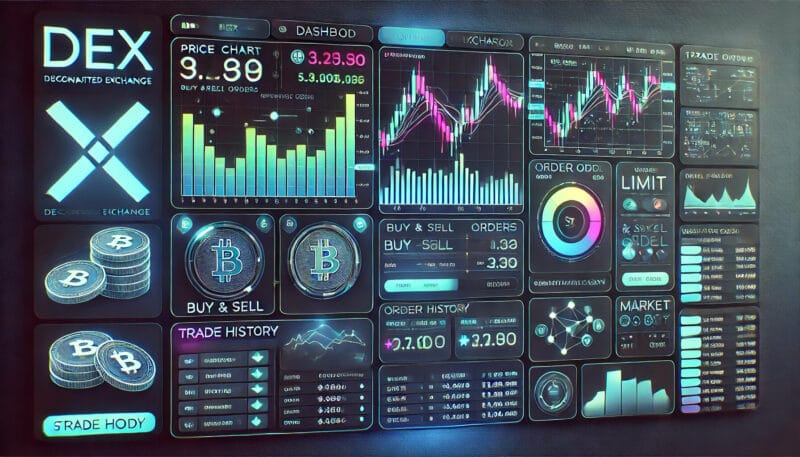1. Introduction: The Rise of Decentralized Exchanges (DEXs)
Decentralized exchanges (DEXs) have become increasingly popular in the cryptocurrency world, offering an alternative to traditional centralized exchanges (CEXs). Unlike CEXs, which operate under a central authority and hold user funds, DEXs function without intermediaries, allowing users to trade directly from their wallets. This structure offers several unique benefits but also introduces certain risks that users need to consider. In this article, we’ll explore the key risks and benefits of using decentralized exchanges, helping you make more informed decisions about your crypto trading strategies.
Why DEXs Are Gaining Popularity
The rise of decentralized finance (DeFi) has fueled the growth of DEXs, as more users seek greater control over their funds, enhanced privacy, and a more secure trading environment. However, the decentralized nature of these platforms also brings challenges that can impact your trading experience.
2. What Are Decentralized Exchanges?
Decentralized exchanges are platforms that allow users to trade cryptocurrencies directly with each other without the need for a central authority. Transactions on DEXs are facilitated through smart contracts, which automatically execute trades based on predefined conditions. This peer-to-peer (P2P) trading model offers a stark contrast to centralized exchanges, where a company controls the exchange, holds user funds, and manages the order book.
- Key Characteristics of DEXs:
- Non-Custodial: Users maintain full control over their private keys and funds, reducing the risk of hacking and theft.
- Privacy: DEXs typically require no personal information or account creation, enhancing user privacy.
- Smart Contracts: Trades are executed automatically through smart contracts, ensuring transparency and reducing the need for trust in a third party.
3. Benefits of Using Decentralized Exchanges
Decentralized exchanges offer several advantages that make them an attractive option for many cryptocurrency traders:
3.1 Enhanced Privacy and Anonymity
One of the most significant benefits of using DEXs is the enhanced privacy they offer. Unlike centralized exchanges that often require users to undergo Know Your Customer (KYC) procedures, DEXs typically do not require personal information to trade. This feature appeals to users who prioritize privacy and wish to keep their trading activities anonymous.
- Example:
- A user can trade cryptocurrencies on a DEX without providing identification documents or other personal information, maintaining their anonymity throughout the process.
3.2 Greater Control Over Funds
DEXs are non-custodial, meaning that users retain control of their private keys and funds at all times. This reduces the risk of losing assets to hacks or insolvencies, as the exchange never holds user funds. In contrast, centralized exchanges require users to deposit funds into the exchange’s wallet, exposing them to potential risks if the exchange is compromised.
- Example:
- A user can trade directly from their wallet on a DEX, ensuring that they remain in control of their assets and are not dependent on the security of the exchange.
3.3 Security and Trustless Environment
Because DEXs operate through smart contracts, they eliminate the need for users to trust a central authority. Trades are executed automatically, and the transparency of the blockchain ensures that all transactions are publicly verifiable. This trustless environment reduces the risk of fraud and manipulation that can occur on centralized exchanges.
- Example:
- On a DEX, a user can verify the smart contract code and the transaction history, ensuring that the platform operates as expected without relying on third-party assurances.
3.4 Accessibility and Global Reach
DEXs are accessible to anyone with an internet connection, regardless of their geographic location. This global reach allows users in regions with restricted access to financial services to participate in cryptocurrency trading without the barriers imposed by centralized exchanges.
- Example:
- A user in a country with strict financial regulations can access a DEX to trade cryptocurrencies without needing to navigate complex legal requirements.
4. Risks of Using Decentralized Exchanges

While DEXs offer numerous benefits, they also come with certain risks that users should be aware of:
4.1 Lower Liquidity
One of the primary challenges with using DEXs is lower liquidity compared to centralized exchanges. Liquidity refers to the ease with which assets can be bought or sold without causing significant price fluctuations. Lower liquidity on DEXs can lead to higher slippage (the difference between the expected price of a trade and the actual executed price) and difficulty executing large trades.
- Example:
- A user trying to sell a large amount of a low-liquidity token on a DEX may experience significant slippage, resulting in a lower-than-expected sale price.
4.2 User Experience and Complexity
DEXs can be more complex to use than centralized exchanges, particularly for beginners. The need to manage private keys, understand smart contracts, and navigate decentralized interfaces can be daunting for new users. Additionally, the lack of customer support on most DEXs means that users are on their own if they encounter issues.
- Example:
- A new user may struggle to set up a wallet, connect it to a DEX, and execute trades without the guidance or support typically available on centralized exchanges.
4.3 Smart Contract Vulnerabilities
While smart contracts offer security and automation, they are not immune to vulnerabilities. Bugs or exploits in the smart contract code can lead to significant losses for users. Since DEXs operate without intermediaries, there is no central authority to recover lost funds or offer compensation in the event of a smart contract failure.
- Example:
- A DEX suffers from a smart contract bug that allows hackers to drain funds from the platform, leaving users with no recourse to recover their assets.
4.4 Limited Asset Selection
Compared to centralized exchanges, DEXs may offer a more limited selection of assets. This limitation is due to the reliance on liquidity providers to supply assets to the platform. If there is insufficient liquidity for certain tokens, users may not be able to trade them on the DEX.
- Example:
- A user looking to trade a niche or newly launched token may find that it is not available on their preferred DEX due to lack of liquidity or support.
Conclusion: Weighing the Risks and Benefits of DEXs
Decentralized exchanges represent a significant shift in how cryptocurrency trading is conducted, offering enhanced privacy, security, and control over funds. However, these benefits come with trade-offs, including lower liquidity, complexity, and the potential for smart contract vulnerabilities. Understanding these risks and benefits is crucial for anyone looking to participate in the DeFi space and make informed decisions about their trading strategies.
For more insights and detailed guides on decentralized finance, explore our DeFi Guides section.
Stay Updated
For the latest updates on decentralized exchanges and DeFi trends, follow us on:
Stay informed with the latest strategies and insights in the world of decentralized finance at FreeCoins24.io.
Special Offer
Ready to explore decentralized exchanges? Sign up on Bybit today and take advantage of up to $30,000 in deposit bonuses. Start trading on top DeFi platforms with confidence.
















